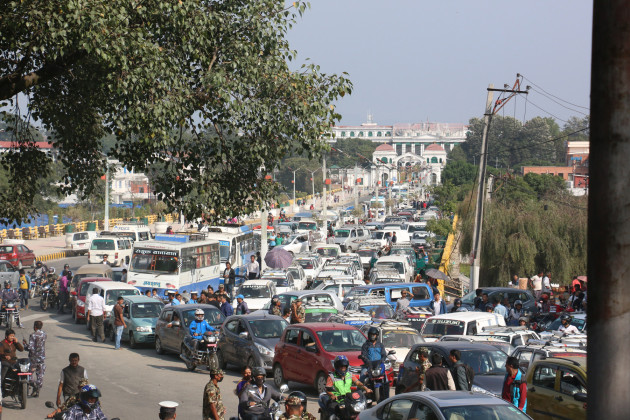Augment diplomatic and political process to cope up rising challenges (Commentary)
 By Narayan Prasad Ghimire / Kathmandu: ‘Don’t you know? The shortage of fuel is likely again! How many gas cylinders have you filled, and what about your motorcycle?’ It is what one can hear people saying at any intersections in the capital city Kathmandu after various agreements, including on trade and transport, construction of storage for petroleum products were signed with Nepal’s northern neighbour during Prime Minister KP Sharma Oli’s recent visit.
By Narayan Prasad Ghimire / Kathmandu: ‘Don’t you know? The shortage of fuel is likely again! How many gas cylinders have you filled, and what about your motorcycle?’ It is what one can hear people saying at any intersections in the capital city Kathmandu after various agreements, including on trade and transport, construction of storage for petroleum products were signed with Nepal’s northern neighbour during Prime Minister KP Sharma Oli’s recent visit.
It was clear signal of fear with diminishing hope of smooth supply of essentials- the fear with the rumour of another blockade. This of course is also evidence of how sensitive Nepalis are towards politics. And, why not be, as Nepali politics is omnipresent- from spilling on every household’s kitchen to protesting on street and filibustering parliament to the obstructing the border.
The Nepalis who had survived the devastating earthquakes were badly stung by the torturous blockade for more than five months. The felicity of the Nepalis with new constitution was not only snubbed but awarded with a blockade by the southern neighbour. It was because that hangover of the sting which was amplified with the rumour of another border obstruction. To be very clear, the Nepalis again fear of possible economic embargo in revenge to Nepal’s recent agreement with China.
The botched up Nepali politics blatant since 1990 has stood as domino effects. One after another the political developments are depicting a bleak future ahead. Whether it is creative youths or the bureaucracy that stands as the permanent government, self-centered politics left no bounds to ruin the system in the name of political freedom. Protests were valorized by subsiding duties. Lefts saw the rightists as enemy, and the rights saw the lefts as anarchist. Cooperation and collaboration eluded. Gradually, it led to the emergence of the demands of region-based rights and ethnicity-based states in this diverse country. The hard earned democracy was derailed and thereby development delayed.
What’s the reason behind it? Its politics, as everything seems fair in politics.
One may find these premises not in order to draw conclusion that- it is the messy politics behind the present imbroglio, but it is in fact the truth.
However, one is not forced to stay away from the wonders: Is the present situation really a mess? Are our political parties staging a flop show, resulting in foreign interference? Is Nepali diplomacy that naïve in diplomatic dealings? What are the premises behind the EU-India statement that has reiterated the need of making the constitution lasting and inclusive?
It is not however the first time that such a statement had been made pointing out the need of making Nepal’s constitution inclusive. India and the UK had earlier pointed out the same stand. It is clear that India is still sulky regarding Nepal’s constitution, and internationalizing his petulance.
Yes, regarding these pertinent and pressing issues dogging every Nepali from an ordinary folk to intellectual clique, foreign affairs expert Dr Shambhuram Simkhada said, “The EU-India joint statement is the reflection of Nepal’s divided internal politics and incompetent diplomacy.” To the government and many political parties’ decry of the statement, Dr Simkhada says, “International relations are guided by principles/values on the one hand while dominated by the power on the other. So, it is essential to improve Nepali politics and diplomatic competence accordingly.”
Moreover, he makes further argument that the world political system at present is full of dual character- equal respect to every state, while maintenance of traditional hierarchy of power. “If the diplomatic ability is not whetted in view of the country’s reality, Nepal may see tough days,” he warned underscoring the need of robust politics and able diplomacy. As he said, Nepal is in dire need of robust politics- the politics of unity that encompasses all parties.
At this situation what is the major responsibility of our political parties? A fitting answer comes from a political analyst Puranjan Acharya. Writing in a national daily, analyst Acharya terms the current relations between Nepal and India a ‘cold war’. “At present, main mandate of the political parties in Nepal is to make meaningful efforts to bring the Madhesi Front in the mainstream, and normalize relations with India. The parties should haste to amend the constitution and address the disgruntled ones. But, there seems no discussion in this regard”.
The politics of hacks and factions in the ruling communist and the rightist parties have shadowed the national agenda while the opposition Nepali Congress has not got time to get out from the internal democratic practice, adds Acharya.
Neighbours are neighbours. Geography does not change. Now, the political parties, isn’t it time to correct behaviours and boost the country’s diplomatic competence? RSS
